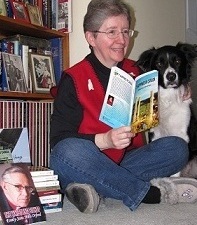
About Emily-Jane Hills Orford:
Many of Emily-Jane’s stories and novels reflect her national pride. She loves writing about Canada and the extra-ordinary Canadians who have made Canada a great nation. Emily-Jane’s stories have appeared in History Magazine, Canadian Stories Magazine, and Western People. She has written several fiction and non-fiction books: Spring, Summer, Autumn, Winter, Ukulele Yukon, Letters From Inside, The Creative Spirit, It Happened in Canada (Books 1, 2, and 3), Personal Notes, The Whistling Bishop, Songs of the Voyageurs, F-Stop: A Life in Pictures, Still Delicious, Amazingly Extra-Ordinary Women and To Be a Duke. An award-winning author, she was named a Finalist for the 2009 Next Generation Indie Book Awards with her book, The Whistling Bishop (Baico), Finalist in the 2012 Next Generation Indie Book Awards with her book, F-Stop: A Life in Pictures (Baico), and again Finalist in the 2015 Next Generation Indie Book Awards with her book, as well as Honorable Mention in the 2015 Readers’ Favorite Book Award, To Be a Duke (Christine F. Anderson Publishing).
What inspires you to write?
Quite simply: life. There is so much in life, in the real person’s living around me, in the stories of my ancestors and the stories of people throughout history. Every life has a story. Every life is a story. Even the life a dog. Our dog, Duke, has a story and it was a story well worth sharing in the hopes that he would inspire people to care for their animals and to love them unconditionally as our pets love us.
Tell us about your writing process.
I just write. I don’t think there’s any pattern or formula to writing; it’s just what works for the writer. I carry a small notebook with me everywhere (a real paper notebook, not an electronic one) and I spend every minute that I sit waiting (in doctor’s offices, dentist offices, waiting for the bus or the train) writing something, anything. I can’t sit still and do nothing. I have to always be writing. Even when I walk the dog, I’m plotting a scene or sketching a character in my head, which I immediately write down as soon as I return from our walk.
For Fiction Writers: Do you listen (or talk to) to your characters?
I am a good listener. Always have been. I listen to everyone around me and I develop dialogue characteristics from those whom I listen to. Yes, I listen to my characters as well. They talk to me. I don’t always respond, but I do write down what they have to say.
What advice would you give other writers?
Just write. Don’t worry about not having the time to write. Just do it. I tell my students to start with five minutes a day and make it part of the daily routine. Also, keep a journal and carry a notebook wherever you go. You never know when or where inspiration will hit you. Ignore criticism. It doesn’t mean you’re not good enough. Sometimes it’s constructive criticism and it helps improve your writing technique, but a lot of criticism can be vindictive and unhelpful. We, as writers, as artists, need to feel good about ourselves and our work and we need to believe in ourselves. A rejection letter doesn’t mean that our writing is worthless; it just means that the right publisher has not yet been discovered. Send it out again and again and let the rejection letters collect dust. Or, better yet, use the rejection letters as wallpaper in the cottage outhouse.
How did you decide how to publish your books?
I guess I kind of stumbled into P.O.D publishing initially. I found publishers in this venue interested in my work and I knew that I had to start somewhere. I finally found a traditionally publisher with Christine F. Anderson Publishing who published my most recent book, “To Be a Duke”, and who is publishing my next book, “Gerlinda”, which will be released sometime in 2016.
What do you think about the future of book publishing?
As long as we have readers, there will be a need for new books and new authors. Overall, the future of book publishing frightens me. The next generation is more interested in high tech toys than books and the reading population is diminishing. Those who do read are more interested in ebooks or buying used books cheap (which doesn’t help the author). Although authors appreciate people reading their work, they also need to support themselves and this can only be done through the sale of new books and royalties.
What do you use?: Professional Editor, Professional Cover Designer
What genres do you write?: creative nonfiction, memoir, fiction, historical fiction, mystery
What formats are your books in?: eBook, Print, Both eBook and Print
Website(s)
Emily-Jane Hills Orford Home Page Link
Link To Emily-Jane Hills Orford Page On Amazon
Your Social Media Links
Goodreads
Facebook
Twitter
LinkedIn
All information in this post is presented “as is” supplied by the author. We don’t edit, to allow you, the reader, to hear the author in their own voice.
